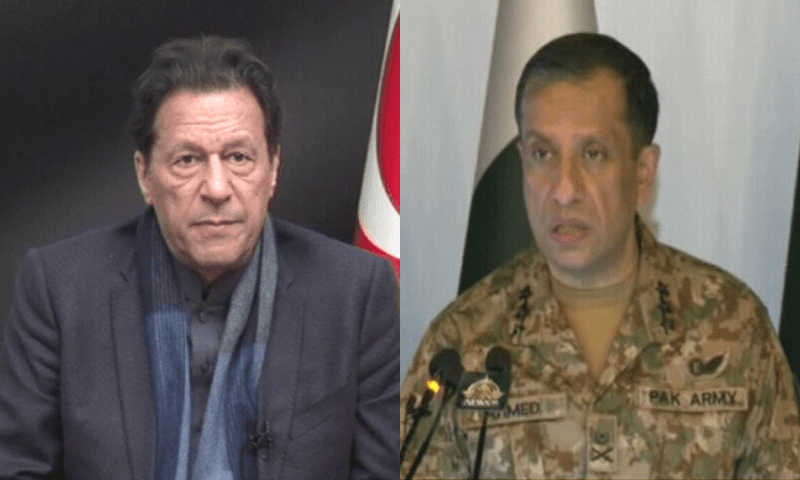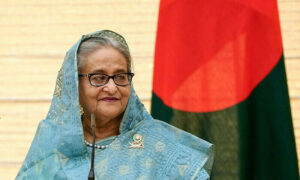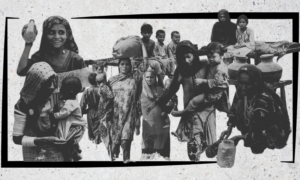• ISPR chief claims military does not ‘pursue political agenda’, not opposed to any political party
• Gen Chaudhry says 193 security officials, 90 ‘extremists’ killed in over 30,000 IBOs this year; asks civilians to do more to keep terror in check
ISLAMABAD: The army on Thursday hinted at a military trial for former prime minister Imran Khan, warning that using military personnel for personal or political gains invites legal action.
“Under military law, anyone who uses individuals subject to the Army Act for personal or political gain and evidence of such actions exists, will be subject to the law taking its course,” military spokesman Lt Gen Ahmed Sharif Chaudhry stated during a media briefing at the Inter-Services Public Relations office located in the General Headquarters.
In response to a query about the potential military trial for Imran Khan, the general attempted to sidestep the question by stating that the matter was sub judice and the question by the journalist was hypothetical. However, he simultaneously outlined the conditions under which a civilian could be tried under military law.
The spokesman’s statement appeared to be referencing Section 2(d)(i) of the Army Act, which extends the act’s purview to civilians who attempt to compromise the duty or allegiance of military personnel to the government. The Army Act, which regulates the conduct and responsibilities of military personnel, also establishes the framework for military trials and outlines the offences and procedures relevant to service personnel.
Though Mr Khan’s military trial had long been speculated, rumours gained traction after he sought intervention from the Islamabad High Court to preempt a possible court martial.
Imran Khan’s plea was prompted by concerns that he might be implicated in the May 9 violence, for which FIRs were filed against him in Rawalpindi. His anxieties were heightened by the arrest and speculation that former spy chief Faiz Hameed might turn an approver against him. These fears seemed to be substantiated by a statement from the federal government’s legal affairs spokesman, suggesting that Mr Khan could be tried under the Pakistan Army Act, 1952.
Gen Chaudhry, in response to a separate question, recalled an earlier ISPR statement on retired Gen Hameed’s arrest, highlighting allegations that the former intelligence chief had contravened the Constitution and laws to advance the interests of certain political elements for personal gains.
When asked about the roles of former ISI chief Naveed Mukhtar and former army chief Qamar Bajwa in the elevation of Gen Hameed and his subsequent appointment as the spy chief, the spokesman passed the onus on to the then-prime minister, saying the ISI director general’s “boss is the prime minister”. His assertion implied that Imran Khan got him appointed to that position. He also cautioned against associating other officers with him without evidence.
The ISPR chief said, “In an expression of confidence in the army’s accountability system, the matter was referred to the army through the Ministry of Defence.”
A ‘court of inquiry’, he said, was commissioned in April this year, and in view of the “solid evidence” in the case, the Field General Court Martial was ordered.
“Court-martial proceedings have been initiated against the officer,” the spokesman said, adding that no timeframe could be given for the completion of the process. He further stressed that “anyone involved in this case will not evade the law’s reach.”
“The army is not opposed to any political party, nor does it support any,” he maintained, adding that the military kept a professional relationship with the government as laid down in the Constitution and the law.
No political leanings
According to the spokesman, the army in view of its national character neither pursues any political agenda nor has political biases and preferences.
To support his argument, Gen Chaudhry said, “If anyone in the army works for the attainment of personal interest and promotes certain political agenda for personal benefit then the internal accountability system kicks in.”
Counter-terrorism operations
Speaking about the counter-terrorism operations, Gen Chaudhry said 32,173 intelligence-based operations were carried out in the first eight months of this year, including 4,021 in the last month alone, which resulted in the killing of 90 alleged extremists.
He estimated over 130 operations are carried out daily by the army along with police, intelligence, and other law enforcement bodies. The spokesman noted that 193 soldiers were martyred over the past eight months and vowed to carry on this fight until the end of terrorism.
In response to a query about the frequent need for operations and the persistence of terrorism, Lt Gen Chaudhry indirectly criticised the civilian authorities, suggesting that their inadequate efforts were a significant factor in the ongoing terrorist threats.
Gen Chaudhry stated that since the onset of counter-terrorism operations, the military has successfully cleared approximately 46,000 square kilometres of territory, eliminating all no-go areas and terrorist strongholds. “We have accomplished the clear and hold stages of our counter-insurgency strategy, and are now conducting intelligence-based operations (IBOs) to sustain this progress,” he said.
However, he expressed regret that the build and transfer phases, which were the responsibility of local and provincial governments, had yet to be completed. This has resulted in some areas requiring clearance operations again. “In some regions, the government’s writ is only maintained through military operations,” he noted, emphasising that prolonged military involvement has its own implications and can lead to negative narratives about the army.
The spokesman stressed that in accordance with the original and revised National Action Plans (NAP) and ‘Operation Azm-i-Istehkam’, the civilian leadership must also take steps to strengthen the criminal justice system, disrupt the terrorism-crime nexus, and develop a robust narrative against extremism and terrorism.
Lt Gen Chaudhry further observed that since the return of the Taliban to power in Afghanistan, facilitation of TTP from across the border had increased. He said that this issue of cross-border facilitation of terrorists was being addressed.
Published in Dawn, September 6th, 2024







